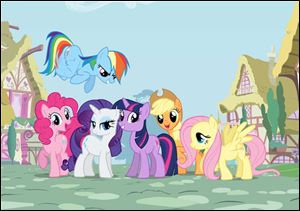
CULTURE SHOCK
‘Brony’ phenomenon shrugs off mainstream bullying, ridicule
10/18/2013

My Little Pony: Friendship is Magic is a popular animated show about the adventures of a group of magical talking ponies with names like Twilight Sparkle, Applejack, and Pinkie Pie.
It’s a show primarily aimed at the young girl demographic.
So why is a 26-year-old Toledo paramedic tuning in?
For starters, said Mike Amborski, the show is smart, upbeat, and full of pop-culture references aimed at the above-elementary school crowd.
“It is just really funny,” he said. “The characters have a lot of depth and have a lot of quirky character traits that establish each individual character.”
Amborski is a self-proclaimed “brony,” a new type of loud and proud fandom that, like so many unconventional groups before it, is misunderstood and mocked by the mainstream.
The term brony is a combination of “bro” and “pony” and it’s a fairly recent phenomenon, though My Little Pony has been around as a toy and in various animated series and a theatrical film since the 1980s.
But like most bronies, Amborski was never interested in My Little Pony as a show or toy until much more recently.

Ponies are, from left, Pinkie Pie, Rainbow Dash (top) Rarity, Twilight Sparkle, Applejack, and Fluttershy.
It’s an appreciation that started, innocently enough, as he and his girlfriend watched My Little Pony: Friendship is Magic along with his roommate and his roommate’s young daughter, both of whom were already fans of the show.
“It just happened to be on one day and I caught a few episodes,” Amborski said. “It’s a pretty carefree show, one … where you don’t have to deal with a lot of the world’s problems.”
He’s since streamed every episode on Netflix and has bought several small My Little Pony figurines. He also has a My Little Pony T-shirt, wallet, and keychain.
Amborski’s brony-ism isn’t an aberration, either, as there are enough fanboys and fangirls — teenagers and adults — to merit an annual gathering known as BronyCon.
Los Angeles-based filmmaker Laurent Malaquais covered the event as part of his documentary Bronies: Adult Fans of My Little Pony, which debuted Monday on Logo TV. It was a project largely funded by bronies through Kickstarter.
Initially, Malaquais and the film's producers were asking for $60,000. Within three days they raised that, and nearly a month later, they had more than $240,000 to go with it.
"It just kept going because [fans] felt it was really important that they had a documentary to tell their story," he said. Collectively, their story is funny, sad, and triumphant, as the mostly teenage boys and 20-something men deal with ridicule and scorn from bullies and even members of their own family. The harassment is why many bronies remain closeted to everyone but fellow fans.
"For some parents," having a brony son "was the same as being a pedophile," Malaquais said. "It's just amazing."
And while some link the negative reaction to homophobia, the documentary director said he believes it's something else, a real fear by parents "scared [that] their children are being infantile and might be mentally disabled."
In fact, his experience with the fandom proved counter to that concern.
Malaquais said bronies are typically highly intelligent, generous, caring, and giving — mirroring the show's core message of the many positive traits that comprise the elements of harmony.
"It's like a very drug-free hippie movement," he said. "Friendship to them is everything."
Credit for the brony movement goes to Lauren Faust, the creator and coexecutive producer of My Little Pony: Friendship is Magic, who previously wrote and directed episodes of Cartoon Network's The Powerpuff Girls, a show with an all-ages and gender appeal.
Malaquais said Faust, as a fan of the 1980s My Little Pony toys but not its original spin-off cartoon, imagined and wrote her own adventures for the ponies, thus making her the patient zero of bronies. These same stories and ideas also served as a 50-page template to the show she pitched to Hub Network executives decades later.
When My Little Pony: Friendship is Magic premiered in 2010, critics were dismissive, but the show grew a loyal audience, especially among men — something Faust didn't expect.
"She was floored by the response," Malaquais said. "I don't think she really understood how big it had gotten until she took in BronyCon last year. She received a standing ovation from over 5,000 fans. She was a rockstar. She couldn't stop crying."
Faust has since departed the show, which returns for a fourth season next month, but the brony fandom continues on sites such a equestriadaily.com, a showcase for art, stories, and music based on the show, as well as animated shorts that rival the network's in terms of production quality.
Even when My Little Pony: Friendship is Magic is inevitably canceled, Malaquais said he expects the fans to keep the colorful characters and their adventures alive. "If it continues, it's on the bronies," he said.
He's also curious about this generation of My Little Pony fanboys/girls.
"In 20 years from now ... we could have a brony president," he said. "It's possible. They're highly intelligent people.
"I'm blown away to see what they'll be and if they take the elements of harmony with them.